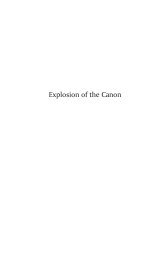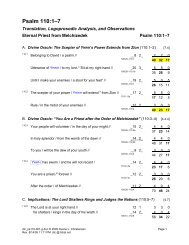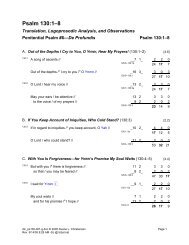Reading Genesis 1-2 in Hebrew - Bibal.Net
Reading Genesis 1-2 in Hebrew - Bibal.Net
Reading Genesis 1-2 in Hebrew - Bibal.Net
You also want an ePaper? Increase the reach of your titles
YUMPU automatically turns print PDFs into web optimized ePapers that Google loves.
<strong>Read<strong>in</strong>g</strong> <strong>Genesis</strong> 1–2 <strong>in</strong> <strong>Hebrew</strong><br />
This pronunciation, however, is due to an error dat<strong>in</strong>g as far back as the 14 th century CE, which<br />
attempts to read this <strong>Hebrew</strong> word as written. Jewish reverence for the name, which may never<br />
have been pronounced <strong>in</strong> normal life <strong>in</strong> ancient Israel, led to the substitution of the word yƒnOd‹'<br />
(“Lord”) <strong>in</strong>stead. In order to rem<strong>in</strong>d themselves of this tradition, later Jews regularly po<strong>in</strong>t hwhy<br />
not with its own vowels, but with those of yƒnOd‹' (“Lord”) as here.<br />
�����������������������‰����������������������<br />
������������������������‰����������������������������2:5�<br />
�����������������„<br />
�����������û��‘��������<br />
���������‘��������������‹<br />
�����������������������ƒ���<br />
������������‘������„�������������������������<br />
�����—transliteration: w¸-kOµl WÓµ-ax haW-WA-deµh Xeµ-rem<br />
yih-yeµh bA-'Aµ-rec, “and every shrub of the field was not yet <strong>in</strong> the earth.” The noun axyiW (“shrub,<br />
bush, plant”) is <strong>in</strong> construct relation with the def<strong>in</strong>ite noun hedLAWah (“the field). The adverb of time<br />
£ereX (“not yet, before that”) appears here with h∆y¯hiy the Qal imperfect 3 rd sg. masc. form of the<br />
verb hyh (“be[come]”). The sense of the verb here illustrates the difficulty <strong>in</strong> determ<strong>in</strong><strong>in</strong>g the<br />
tense of the imperfect <strong>in</strong> <strong>Hebrew</strong> as we are forced to translate the text periphrastically (with Fox<br />
and Korsak): “no shrub of the field was yet <strong>in</strong> the earth.” The vowel <strong>in</strong> the preposition ñb (“<strong>in</strong>”)<br />
represents the vowel of the def<strong>in</strong>ite article it displaces, which is lengthened <strong>in</strong> compensation for<br />
the fact that the follow<strong>in</strong>g ' cannot be doubled.<br />
�����������������„<br />
�����������û<br />
��‘�����—transliteration: w¸-kol-vEµ-Web haW-WA-deµh Xeµ-rem yic-mAµx, “and<br />
every plant of the field had not yet sprouted.” Korsak renders it: “no plant of the field had yet<br />
sprouted.” The masc. noun beWEv (“herb[age]”) appears elsewhere as grass or food for cattle.<br />
Here it is <strong>in</strong> construct relation with the def<strong>in</strong>ite noun hedLAWah (“the field), like axyiW <strong>in</strong> the previous<br />
l<strong>in</strong>e. The adverb of time £ereX (“not yet”) here governs the Qal imperfect 3 rd sg. masc. form of the<br />
root xmc (“sprout, spr<strong>in</strong>g up”).<br />
��������‘��������������‹<br />
�����������������������ƒ—transliteration:<br />
KÓµ lOµ' him-CXÓµr yhwh 'È-lO-hÓµm<br />
val-hA-'Aµ-rec, “for YHWH-Elohim had not sent ra<strong>in</strong> upon the earth.” The verb ryiX⁄mih is the Hiphil<br />
perfect 3 rd sg. masc from the root rXm (“ra<strong>in</strong>”), which is preceded by the adverb of negation 'Ol<br />
(“not”).<br />
������������‘������„����������������<br />
������—transliteration: w¸-'A-dAµm 'aµ-y<strong>in</strong> la-v·-bOµd 'et-hA-'·-Da-MMm‰µ, “and<br />
there was no human to work the ground.” Taken literally, the first two words may be translated:<br />
“and a human (there was) not.” The word §iya' is much more common <strong>in</strong> the construct state as §yE'<br />
where it functions as a particle of negation. In the absolute form, the word is a substantive with<br />
the mean<strong>in</strong>g “noth<strong>in</strong>g, naught,” which is always used as a predicate; hence the phrase means<br />
“and a human was not,” or “there was no human.” The verbal form dOb‹val is a Qal <strong>in</strong>f<strong>in</strong>itive<br />
© 2005 BIBAL Corporation, All Rights Reserved Version 1.0<br />
24





